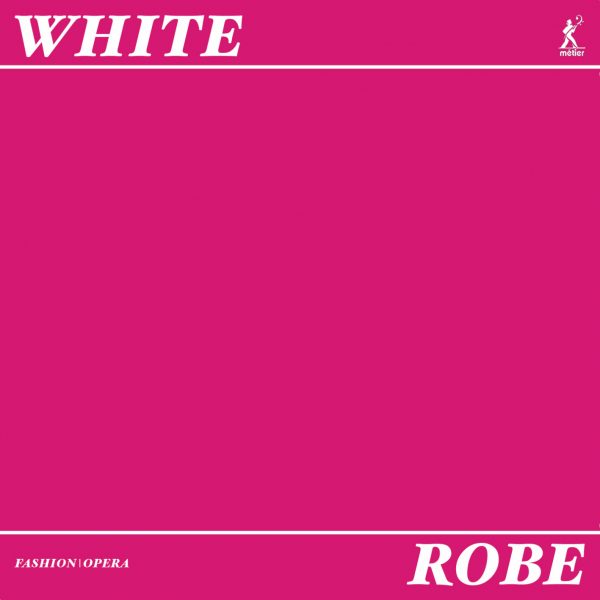Opera
Though opera and fashion are not usually thought of as serious partners, signs of cohabitation have been around for some time, in productions involving the likes of Karl Lagerfeld, Gianni Versace, Christian Lacroix, Miuccia Prada, Emanuel Ungaro and many others. But now, in the recent work of the Scottish composer Alastair White, such collaboration has developed to the point of becoming foundational and programmatic.
Together with the fashion writer and curator Gemma A. Williams, White has set up a production company (UU Studios) to explore so-called ‘fashion operas’, two of which have appeared: Wear (2018), and the piece now issued on CD, Robe (2019), a one-act opera that was premiered in London as part of Tete a Tete’s experimentally-minded opera festival.
White’s views are provocative and refreshing: he wants opera to be critical, to create a space for utopian thinking, to make a difference to the world. It’s a task for which, in his view, opera is well suited, since art in general is ‘a chainsaw that hacks out the basis of perception’ and opera ‘is its most powerful form’. Opera combines and transcends; precisely for this reason, he believes it to be the genre best equipped to create ‘a radical new concept of subjectivity’, one geared to the ‘letting go of our old-fashioned selfhood’ and to ‘the optimism of a community where our imposed individualities combine’. Albeit less convincingly, this seems also to create a space for fashion. The soprano Kelly Poukens, who sings the Storyteller on this recording, is full of admiration for ‘the way the audience for our operas is a mix between fashion-lovers going to fashion shows around the world, and a group of people who are open to new experimental performances’. Certainly the costumes in Robe are striking: that much is clear from the photos online, and from the Vimeo film of the performance (available at https: //www. tete-a-tete .org. uk/e vent/robe/). Problems lie elsewhere, however; and, since there is so much to admire in what the composer tells us of his ambition, their arrival is a non-trivial disappointment.
Robe is set in a future society, a post-human world where the real and the virtual have merged, and cartography can fuse with artificial intelligence. A threatening super-intelligence has formed a desire to become a living city. A young cartographer is given the job of making this happen, so she enters the creature’s mind to do her work. But things turn out differently from what was intended. That, ostensibly, is the nub of the story. In truth, however, it’s difficult to fathom what is really going on. The highly abstract libretto is obscurantist at best, and a somewhat pretentious distraction at worst; it makes little sense when read on its own, and even less when heard together with a score replete with its own deliberate and highly complex artifices. The cast is small (just four female singers, accompanied by a flautist and a pianist who sometimes also plays the woodblock). The music is crisp, emphatic in its lines, strongly punctuated, severely fragmented, sharply pointillistic, high-modernist in orientation. It’s also unrelenting, and only occasionally arresting. In its roughly 70-minute duration there is little that offers relief from the austere, almost puritanical avant-gardism of both score and libretto, made still more sonically intractable by an almost monochromatic palette. Most of the writing is for solo voices; the rare duos and trios are very welcome changes of texture, and yield some of the most likeable moments. Another of these moments is the conclusion: striking and touching, its congeniality has a lot to do with its simplicity. But such moments, alas, are rare. For much of the work’s length, the music seems to me largely uninteresting—except perhaps for the curious persistence of an idiom still in the grip of a compositional ideology whose heyday one had believed to be long past. More dispiriting still, particularly in light of the composer’s admirable social intentions, is that there are so few moments where I sensed a genuine compositional wish to communicate with an audience, at least beyond one presumably made up of initiates. Yet those moments do sometimes occur. I hear in them the inklings of a freer, more humane, more ‘embodied’ musical sensibility, which I hope that a composer as capable as White will find ways of nurturing.
Assembled for the occasion is the cast from the premiere: a group of superb young vocal talents. The mezzos Clara Kanter and Rosie Middleton and the sopranos Sarah Parkin and Kelly Poukens have impressive pedigrees in the performance of contemporary music. If there is one unmitigated pleasure to be had from this recording, it is hearing these singers’ assured, fine-voiced mastery of such difficult vocal writing, so commendably accompanied by the instrumental duo’s highly charged performance.
@divineartrecordingsgroup
A First Inversion Company
Registered Office:
176-178 Pontefract Road, Cudworth, Barnsley S72 8BE
+44 1226 596703
Fort Worth, TX 76110
+1.682.233.4978












